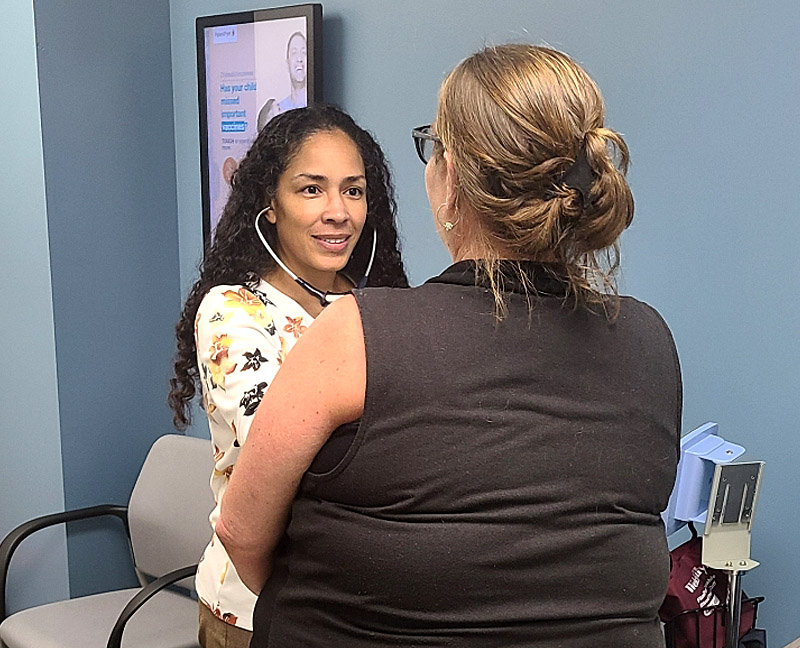Concerned About Cholesterol? Your Doctor Can Help!

By Dr. Alex Buford
As a primary care doctor with Shore Physicians Group’s Mays Landing office, my overall goal is to help my patients live long, healthy and happy lives. One of the most important ways we can achieve that together is by monitoring and managing your risk factors for heart disease – including your cholesterol levels. If you’re concerned about heart disease and cholesterol, it’s time to schedule an appointment with your primary care doctor. We can be your biggest ally in your heart disease prevention journey, partly through vigilant cholesterol monitoring and helping you make effective lifestyle changes.
Cholesterol Monitoring: A Window into Heart Health
Cholesterol is a fatty substance produced by your liver and found in certain foods that serves as a building block for vital functions in the body. However, an imbalance in cholesterol levels can pave the way for heart disease. While it is just one of many contributing factors to heart disease, getting your numbers under control can make a big impact.
Through routine blood tests, we assess the levels of different types of cholesterol, including LDL (low-density lipoprotein – the “bad” cholesterol), HDL (high-density lipoprotein – the “good” cholesterol), and triglycerides. These numbers provide valuable insights into your cardiovascular risk. In general, LDL levels should be below 100 mg/dl, HDL levels should be above 60 mg/dl, and triglycerides should be under 150 mg/dl.
We analyze your cholesterol profile in the context of your medical history, genetics, and other risk factors. With this assessment, we can determine your susceptibility to heart disease and tailor preventive strategies accordingly.
Lifestyle Changes for Heart Health
One of my greatest joys as a physician is helping my patients achieve their heart health goals. Recently I had the pleasure of working with a woman* who was in her early 40s, and her bloodwork revealed her cholesterol levels were too high. She was also obese, so we had a great conversation about the impact that her weight and cholesterol levels could have on her health and happiness. She became motivated to do something about it, set a personal goal, and within a year she got herself to a healthy weight, and lowered her cholesterol to within normal limits.
While everyone’s cholesterol and heart disease risk is unique, there are some basic guidelines to lowering cholesterol and improving heart health, including:
- Quitting smoking or vaping (smoking damages blood vessels and significantly increases your heart disease risk)
- Increasing physical activity (150-minutes of moderate intensity aerobic activity a week)
- Eating fiber-rich foods (leafy greens, legumes, etc)
- Reducing your intake of saturated and trans fats (i.e. red meat, fried foods, baked goods)
- Eating more heart-healthy fats (i.e. nuts, olive oil, avocado, salmon)
- Achieving a healthy weight
Here’s how my patient and I worked together:
Sustainable Changes: First and foremost, please know that doctors are people, too, who understand we live in a world of temptations. Grilled cheese and French fries are delicious – we get it! But we can’t eat it all the time. I recently realized I was eating French fries from the pizza place across from my office three days a week. I had to cut back to once a week, and I share them with a colleague. And that’s how I talked about it with my patient. She did not completely deny herself, she just cut way back on the foods that were contributing to her weight and cholesterol levels, and found healthier ways of preparing her favorite foods.
Frequent Visits: With this particular patient, she came in every 4 to 6 weeks for weight checks and updates. It was something she wanted and was willing to do to stay accountable, and I was happy to be there for her. Not everyone can afford to do this, but know it is an option.
Celebrating Small Victories: As children, we were often rewarded when we did a good job, but what about as adults? We deserve to hear ‘good job!’ too! As your primary care doctor, I’m here to celebrate your victories, no matter how small. With my patient, we celebrated every small victory – even if the only change was going from ice cream five days a week to two. It’s still a win, and we will build upon that victory.
An Honest Relationship: If you fall off track, don’t hide from us! We won’t yell at you or try to make you feel bad. We all fall off track sometimes, but the important thing is to get back up again. Often, coming in for your doctor’s appointment is just what you need to get back on track.
Ongoing Monitoring and Support: Collaborating with your primary care physician is not a one-time effort but a continuous journey towards heart health. Make sure you’re sticking to your regular appointment schedule so your doctor can track your progress, make necessary adjustments and encourage you on your journey. Also know that in some cases, lifestyle changes alone may not suffice, simply because of your genetics. If medication is required to manage your cholesterol, don’t be hard on yourself. Your primary care doctor can prescribe and monitor their effectiveness, while coaching you to continue with healthy lifestyle changes. Through this partnership, you can make informed choices and take proactive steps towards safeguarding your most vital organ—your heart.
To schedule an appointment with Dr. Alex Buford at her Mays Landing office, please call 609-365-6217.
*Details have been changed to protect privacy.